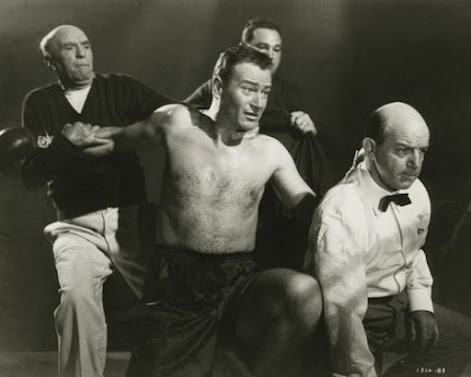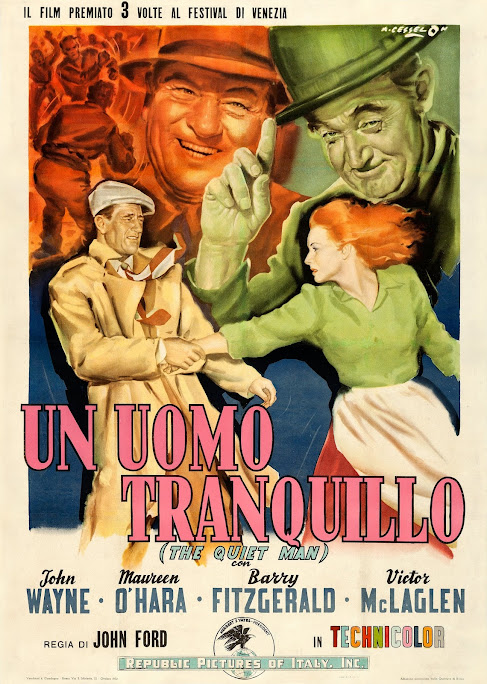To Recognize March 17 ...
The Quiet Man For Me Better Than Ever
Watching a favorite again often means making peace with some aspect of it that was bothersome before. The Quiet Man is rich enough to register different each time I visit, like a hundred or more others we could name. Maureen O’Hara’s Mary Kate was a flag the last time (5/2014) wherein concern was anger re getting or not of her “fortune.” Here and for a first time her motivation made sense, even seemed reasonable given the character’s background and culture. A husband who would let a bully brother-in-law keep what was rightful the wife’s does sort of show a white feather, at least as locals saw it, so yes, the money was critical to marital harmony. To Mary Kate mind, holding out on cohabit access was reasoned response to Sean’s unwillingness to force a showdown with “Red” Will Danaher. Choice characters make in a movie must have sense, even if twisted, for the story to work. And bear too, Sean has his own reasons for action he will or will not take. Ford understood importance of these, as did writer Frank Nugent. Imagine how they labored over The Quiet Man to get beats so splendidly right.
I’ve heard people dump on The Quiet Man for being “too Irish,” which I guess means it is over-boisterous or taken with customs some of us find annoying or inaccessible. Again it comes to characters doing sensible, or irrational, things. Victor McLaglen’s Will seems overbearing for little cause, a barrier to any sort of local progress, including his sister’s marriage. But Will is tricked into approval of that, essentially made a fool of by all his friends and neighbors. His rage upon learning the truth is extreme but, given the circumstance, understandable. We take these people as we find them, even a John Wayne unwilling to raise a fist in defense of himself, until a belated confront with McLaglen. Wayne as Sean has more than persuasive reason to abhor fighting, as we see in a flashback beautifully staged by Ford, as powerful a succession of brief images as the director ever composed. Sean fears a fight because if one is forced upon him, there is chance he will seek to kill his opponent, so how to stage a brawl with Will minus fear of one or the other killed or seriously injured? This would imperil the essential spirit of The Quiet Man, a narrative till now told on genial and good-spirited terms.
Ford does his fix by resolving narrative issues before blows are exchanged, enabling Sean to enter the fight on temperate terms. Having no meaningful conflict left to resolve, nor animus toward Will, he can enjoy the contest for its sport and letting the community observe who is the “best man” in Innisfree. Neither of these are crucial matters to Sean, whose concern was winning Mary Kate back, the marriage having been consummated the night before, so it is really just a matter of getting the three hundred pounds to satisfy her that he is no coward, which they do before fists fly (though I’m still taken aback by so much cash being blithely tossed in a furnace, no matter what it signifies). That Sean and Will become friends after the fight is foregone conclusion toward a happy ending Ford-Nugent conceived, it not mattering who won the bout. As to that, we are not told and don't care. The Quiet Man exalts the splendor of a happy ending for a film done so well as to deserve it. How many others fail to earn their cheerful fade? The Quiet Man lets all its characters smile benignly and face on to the camera, as if waving goodbye to us until next time we watch. It is a flawless movie to mine eyes even if I can’t expect everyone else to agree. I will not let so much time pass before looking at it again. Here’s hope that the Fathom revival in theatres this week will be a success.






8 Comments:
The money in the furnace may be a bit much, but it's a strong visual shorthand showing what the real issues are and how they're finally on the same page. Whenever a character in a film --or in real life, for that matter -- speechifies how it's not about the money, I tend to doubt.
One of the more curious elements is the Protestant vicar Sean confides in. His church is empty, but he seems to be a valued member of the community. At the end a crowd turns out to cheer the visiting bishop to make the vicar look good (the priests are organizing the effort, covering their collars when the bishop passes by). Are they pretending to be his congregation? It's a peculiar bit, not really related to the story.
I'll admit I'm in the minority on this one, but I just don't like Ford as a director, and really loathe this picture.
I don't like the direction, can't stand the story, find the characters a carnival of one-dimensional cliches, and detect an unappealing aura of preciousness mythmaking permeating over the whole affair.
It's truly one of those moves that, if every copy vanished from the Earth, it wouldn't bother me in the least.
You mileage will probably vary.
I recently watched TQM blu-ray. Finally the movie looks great for home video after years of sub-par 16mm prints and goofy-looking VHS and DVDs. I enjoy the movie a lot, but I can't say it's one of my faves. Depending on how many more years I consume oxygen, my recent viewing could be my last.
But when all is said and done, you liked it--didn't you--Dave?
Ha! Revisited for the first time years a few months ago and found it much better than remembered! Only the advanced age of the three principals seemed off key, a quibble easily overlooked (much more easily dismissed here, one must note, than the same issue in even later Ford films).
Often quoted in my house growing up: Helpful Old Woman to John Wayne as he drags Maureen O’Hara through the village: “Here’s a stick with which to beat the lovely lady.”
Hardly politically correct, but still gives me a chuckle.
I'm a fan of the film, too, but I can understand why some would be opposed to the ending when they see Mary Kate eagerly serving dinner for the men folk.
After all of her earlier fiery independence she has finally been tamed by a he man and now acts like a good little housewife should.
If I remember correctly,"The Quiet Man" was a long cherished dream project John Ford wanted to make with John Wayne. But Herbert Yates, head of Republic, doubted its commercial viability. He only greenlit the thing on condition Ford and Wayne would first do a western for the studio - as a Ford/Wayne western was considered money in the bank. Ford agreed to the deal and proceeded to make "Rio Grande"featuring Wayne, O'Hara and McLaglen - all of whom would return for "The Quiet Man".
It turned out to be a win-win situation for all concerned, as both films were hits.
Personally, though, in spite of "The Quiet Man"'s semi-mythic status, I still consider "Rio Grande' a much better picture. Ford was really on a roll at the time. Because the same year "Rio Grande' came out (1950), he also made the magnificent "Wagon Master"
Post a Comment
<< Home